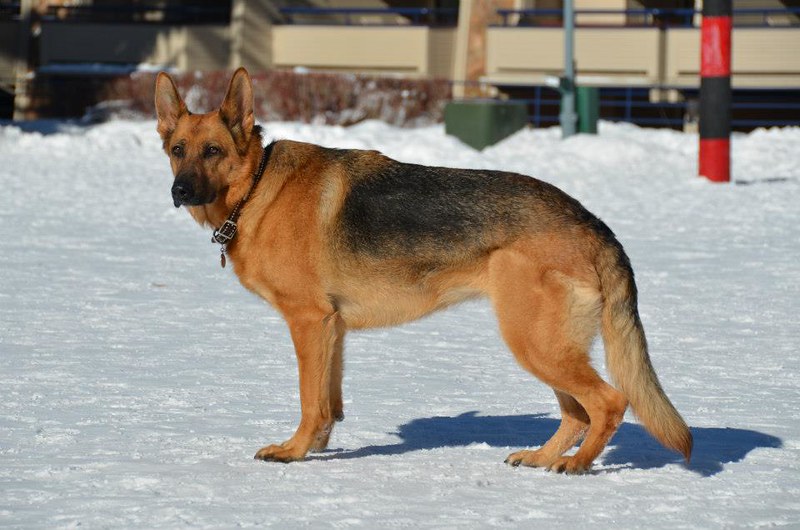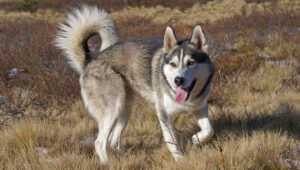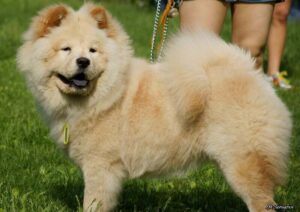The German Shepherd, also known as Alsatian in Britain is a breed of dog that is highly prized for its intelligent , alert, obedient and brave temperament.This dog breed has a long history of serving alongside humans in various roles, including herding, guarding, and police work. The German Shepherd breed was developed by Max von Stephanitz in Germany in the late 19th century, initially bred as herding dogs. However, their intelligence, strength, and trainability soon led them to be used in various roles, including military and police work. During World War I, German Shepherds served as messengers, scouts, and sentries which further solidified their reputation as versatile working dogs.
German Shepherd Summary Table:
| Characteristic | Description |
|---|---|
| Temperament | Intelligent, loyal, confident, courageous, protective |
| Social Behavior | Good with children, aloof with strangers, can be aggressive if not socialized |
| Training Needs | Highly trainable, respond well to positive reinforcement, require early socialization |
| Grooming | Moderate grooming needs, regular brushing to control shedding |
| Care | Need plenty of exercise and mental stimulation, thrive with an active lifestyle |
| Physical Traits | Large, muscular, distinctive tan and black coat, erect ears, intelligent expression |
| Adaptability | Adapt well to various living situations, including apartments with sufficient exercise |
| Nutrition | High-quality diet with appropriate protein and fat levels for their activity level |
| History | Originally bred as herding dogs in Germany, later used for military and police work |

Temperament
They are known for their intelligence, loyalty, confidence, curiosity, watchfulness, courage and bravery. They are courageous and protective by nature, making them excellent guard dogs. They need proper socialization and training from an early age to prevent potential aggression or fear-based behaviors.
Social
While German Shepherds can be reserved and aloof with strangers, they are typically good with children, especially if raised with them from puppies. Early socialization also helps to make them comfortable around people and other animals.

Training
German Shepherds are highly trainable and respond well to positive reinforcement techniques. They do well in obedience training, protection work, and various other canine sports and activities. But, their strong-willed nature means that training should be consistent and firm, yet fair and rewarding.
Grooming
German Shepherds have a double coat that requires moderate grooming. Regular brushing is necessary to control shedding and prevent matting, especially during seasonal shedding periods. Occasional bathing and ear cleaning are also recommended to maintain their overall hygiene.
Care
These energetic dogs require plenty of exercise and mental stimulation to stay happy and healthy. They thrive on an active lifestyle, whether it’s participating in dog sports, going for long walks or hikes, or engaging in interactive play sessions. Providing them with a secure, fenced-in area to run and play is essential.
Physical Traits
German Shepherds are large, muscular dogs with a distinctive tan and black coat. They have erect ears, an intelligent expression, and a strong, well-proportioned body. Their confident and alert demeanor adds to their striking appearance.
Adaptability
While German Shepherds may do well in various living situations, including apartments, they require ample exercise and mental stimulation to prevent boredom and destructive behaviors. With proper care and attention, they can adapt to different environments, making them suitable for both urban and rural settings.
Nutrition
German Shepherds require a high-quality diet that provides appropriate levels of protein, fat, and other essential nutrients to support their active lifestyle and maintain their overall health and well-being.
Quick Facts:
- Height: 22-26 inches (male), 20-24 inches (female)
- Weight: 65-90 pounds (male), 50-70 pounds (female)
- Life Expectancy: 9-13 years
- Breed Group: Herding Group
- Energy Level: High
- Shedding Level: Moderate to High
- Grooming Needs: Moderate
- Exercise Needs: High
- Trainability: Highly Trainable
- Family-Friendly: Yes, with proper socialization
German Shepherd as Pets
German Shepherds can make excellent family pets for active households that can provide them with plenty of exercise, mental stimulation, and proper training. Their loyalty, intelligence, and protective nature make them devoted companions, but they require early socialization and consistent obedience training to prevent potential behavioral issues. With their high energy levels and exercise needs, they may not be well-suited for sedentary lifestyles or households with limited outdoor space.

German Shepherd Price
The price of a German Shepherd puppy can vary widely depending on factors such as the breeder’s reputation, the puppy’s pedigree, and the geographic location. On average, you can expect to pay anywhere from $500 to $1,500 for a German Shepherd puppy from a reputable breeder. However, well-bred puppies from champion bloodlines or those specifically bred for working or show purposes can cost significantly more, sometimes upwards of $3,000 or more.
FAQ about German Shepherds:
Can a German Shepherd Lure Course? Yes, German Shepherds can participate in lure coursing, With their natural prey drive, athleticism, and eagerness to please, they can excel in this activity.
Can German Shepherds Be Left Alone? German Shepherds should not be left alone for extended periods, as they can develop separation anxiety, destructive behaviors, and excessive barking. These intelligent and social dogs thrive on human companionship and can become bored or anxious when left alone for too long. If you must leave them alone, it’s recommended to provide them with interactive toys, puzzle feeders, or arrange for a dog walker or pet sitter to keep them company and ensure they get enough exercise.
Are German Shepherds Good with Cats? With proper socialization and training from an early age, German Shepherds can learn to coexist peacefully with cats. However, their strong prey drive and herding instincts may make them prone to chasing or nipping at smaller animals, including cats. It’s essential to supervise interactions between German Shepherds and cats, especially in the beginning, and provide separate spaces for each pet to have their own territory.




